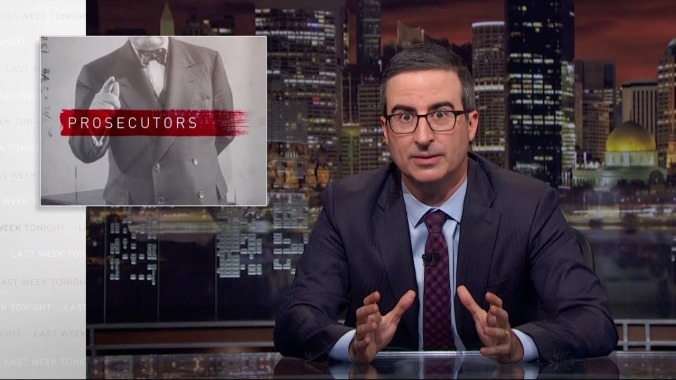John Oliver explains how prosecutors remove justice from the system on Last Week Tonight

Last Week Tonight continued host John Oliver’s Emmy-winning formula last night. You know the one, where Oliver attempts to make the week’s unendingly grim and terrible events go down easier with intermittent asides of humorously exaggerated reactions that only make you feel worse when he gets back to the awful stuff. Well, we see what you’re doing, Oliver and stop it! How does it feel, Oliver, to have your legs kicked out from under you when you’re already feeling wobbly from processing the latest indignantly satirical rundown of human misery, injustice, and venality? Does it feel good, Oliver? Because this is what you do to us!
Anyway, the justice system is broken. That’s Oliver’s contention in last night’s typically whiplash-inducing report on the power—and abuses of power—inherent in the prosecutorial side of the whole Law & Order equation. You just heard the chun-chung sound and that’s what was intended to happen because things are going to get very depressing indeed, so laugh it up while you can! Ahem. As Oliver notes, the fact that 95 percent of all defendants plead guilty without going to trial isn’t indicative of a well-oiled legal machine working as it should, but, instead, pretty much the the complete opposite. Noting that prosecutors, as a matter of course, stack charges and terrify defendants with the specter of longer prison sentences in order to secure a guilty plea, Oliver compared the current system to the “unforgivably dogshit customer service hotline” of new HBO owner (and therefore Oliver’s boss) AT&T, in being “an inadequate system that only functions if people constantly give up.”
Illustrating that point, Oliver spent much of his segment pointing out horror stories where people who pled guilty or were convicted thanks to prosecutorial misconduct were later exonerated—but only after spending decades in prison, including on death row. In addition to scaring people into pleading guilty to things they did not do, Oliver frightened viewers with other judicial inequities. You know, like the practice of “trial by ambush,” where prosecutors hold back crucial evidence from defense attorneys until the day of the trial. Or the widely employed tactic of excluding black jurors from cases featuring black defendants with laughably obvious coded objections that thumb noses at the supposed safeguards against such biased bullshit.
And if viewers were imagining that state bars or the courts themselves are coming down hard on those D.A.s and prosecutors who’ve sent innocent people to the slammer, well, then they don’t know Oliver’s M.O. very well. Naming “tough on crime” prosecutors (like, weirdly, Harry Connick Jr.’s dad, the former D.A. of New Orleans Parish) who’ve been outed for destroying innocent defendants’ lives in their high-pressure, lock-’em-up pursuit of convictions at all cost, Oliver exposed how few (as in virtually zero) are ever held accountable. “The system did not fail,” infuriatingly opined one Dale Cox, acting D.A. of another Louisiana jurisdiction, despite the fact that a man named Glenn Ford was just exonerated there after serving 30 fucking years on death row for a crime he did not do. Oliver also showed a picture of the cute little electric chair model on the desk of Harry Connick Sr.’s lead prosecutor Jim Williams before revealing that every single one of the defendants’ pictures (all of whom were black) Williams had displayed there as trophies have been released from death row. “Yup,” exclaimed Oliver, “The thing he kept as a token of his success is now a monument to poor decision-making.” He then went on to compare that to “the prosecutorial equivalent of Cuba Gooding Jr.’s Oscar. (Objecting to his audience’s groans, Oliver stormed, “You’ve got to be consistent. You might care about Cuba—you care about him too much in this context.”)
So what’s to be done about this deeply flawed, frequently monstrous injustice system? Well, as Oliver notes, D.A.s are elected, nearly 85 percent of them run unopposed in local elections, and reform-minded candidates can redress some of this callous indifference to the truth and to the very lives of the accused. So there’s that.